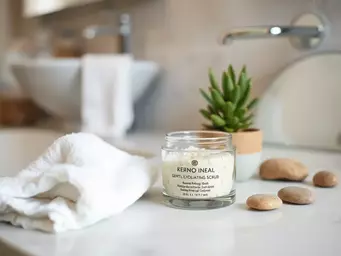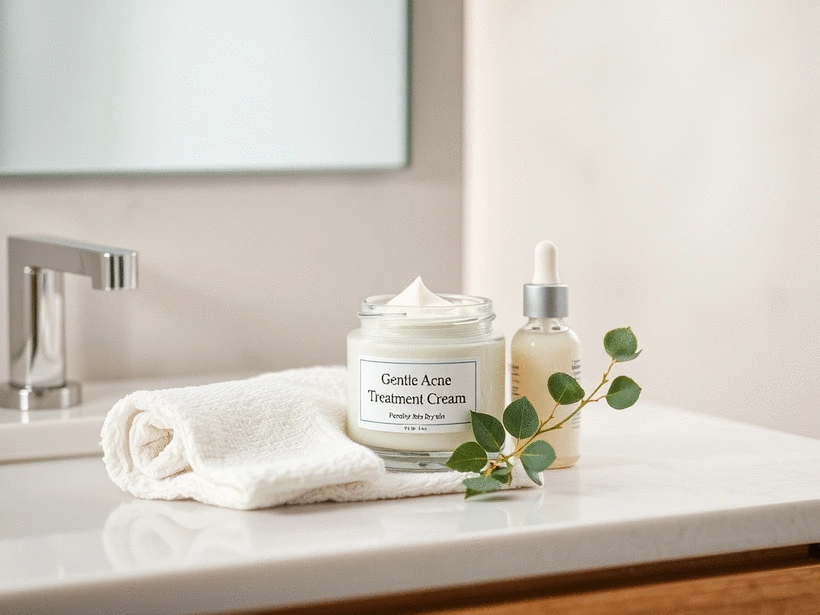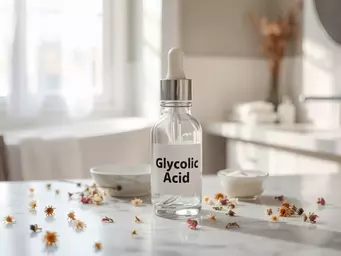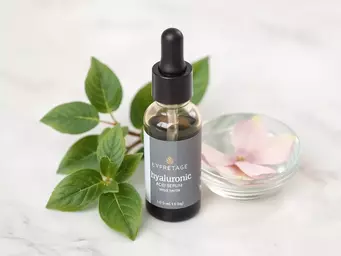Skincare Routine for Dry Acne
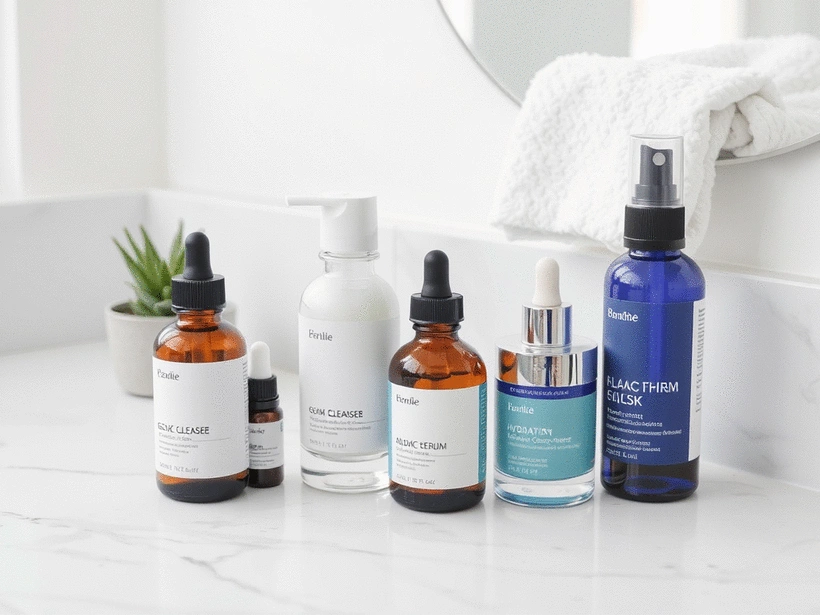
Have you ever felt like you're caught in a constant battle between dryness and breakouts? The struggle of managing dry, acne-prone skin can feel overwhelming, but understanding your skin’s needs is the first step toward achieving a balanced complexion.
What You Will Learn
- Recognize the unique signs of dry, acne-prone skin, including flakiness, inflammation, and tightness.
- Discover the importance of tailoring your skincare routine to address both hydration and acne management.
- Learn about effective ingredients like hyaluronic acid and glycerin that hydrate without clogging pores.
- Understand the role of sun protection in maintaining your skin’s moisture barrier and overall health.
- Explore dietary choices that promote skin health, such as fruits, vegetables, and omega-3 fatty acids.
- Find out how stress management techniques can improve your skin's appearance and reduce flare-ups.
Understanding the Dry, Acne-Prone Skin Balancing Act
Managing skin that is both dry and acne-prone presents unique challenges. This visual outlines the key characteristics and essential solutions for achieving balanced, healthy skin.
Key Characteristics of Dry, Acne-Prone Skin
- Flakiness: Dry patches leading to irritation.
- Inflammation: Redness & swelling around breakouts.
- Tightness: Discomfort after cleansing.
- Increased Oil Production: Body compensating for dryness.
These signs require a delicate balance of hydration & acne management.
Essential Skincare Principles
- Hydration: Cornerstone. Use Hyaluronic Acid, Glycerin, lightweight oils.
- Sun Protection: Broad-spectrum SPF daily to protect barrier & reduce inflammation.
- Tailored Routine: Address both hydration & acne. Avoid harsh ingredients.
- Gentle Exfoliation: Use lactic acid to remove flakes without stripping.
Tailoring products to specific needs is crucial for effective care.
Lifestyle Choices for Skin Health
- Diet: Water-rich foods (cucumber, watermelon), healthy fats (avocado), Omega-3s (salmon).
- Hydration: 8 glasses of water daily for elasticity & toxin flush.
- Stress Management: Meditation, exercise, deep breathing to reduce acne flare-ups.
- Quality Sleep: 7-9 hours for skin regeneration & healing.
A holistic approach supports both skin and overall well-being.
Understanding Skin Types
- Dry Skin: Characterized by tightness & flakiness.
- Oily Skin: Prone to shine & breakouts from excess oil.
- Combination Skin: Mix of dry & oily areas, unique challenges.
- Dry, Acne-Prone: Specific challenges of both dryness & breakouts.
Identifying your skin type is fundamental for effective care.
Understanding Skincare Needs for Dry, Acne-Prone Skin
Have you ever felt overwhelmed by the unique challenges of managing skin that is both dry and acne-prone? You’re not alone! Understanding the specific characteristics of this skin type is the first step in finding the right skincare solutions. At Dry Acne Solutions, we believe that knowledge is power, and knowing your skin helps in crafting a routine that truly works.
Dry, acne-prone skin often presents with a mix of tightness, flakiness, and occasional breakouts. These signs can be frustrating, as you're trying to keep your skin hydrated without exacerbating acne. Recognizing these traits can help you identify the *right products* and routines tailored to your skin’s needs.
Recognizing the Characteristics of Dry, Acne-Prone Skin
The unique challenges and signs of dry, acne-prone skin
When it comes to dry, acne-prone skin, the challenges can feel like a balancing act. Common characteristics include:
- Flakiness: Dry patches that can lead to irritation.
- Inflammation: Redness and swelling around breakouts, a common symptom in acne-prone individuals, as discussed in a paper on the pathogenesis of acne vulgaris.
- Tightness: A sensation of discomfort after cleansing.
These signs not only affect how your skin looks but also how it feels. Identifying them is crucial for selecting suitable skincare products.
Why a tailored skincare routine is essential
Each individual's skin tells a different story, which is why a one-size-fits-all approach doesn't work for dry, acne-prone skin. Tailoring a skincare routine means carefully selecting products that address both hydration and acne management. This customized approach can help in:
- Reducing breakouts while maintaining moisture levels.
- Preventing irritation from harsh ingredients.
- Enhancing overall skin texture and appearance.
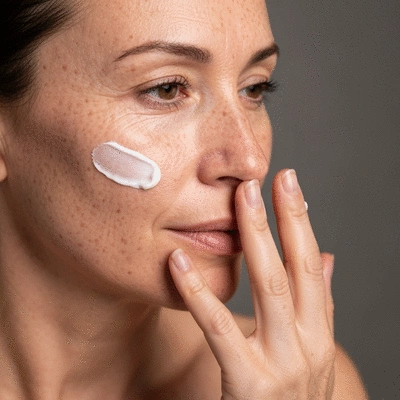
At Dry Acne Solutions, I've seen firsthand how a personalized routine can restore not just skin health, but also confidence. Are you ready to find what works best for your skin?
Basic Principles of Skincare for Dry Skin
Importance of Hydration and Moisture
Hydration is *the cornerstone* of a successful skincare routine for dry skin. When your skin lacks moisture, it can lead to increased oil production as your body tries to compensate, which may worsen acne. To combat this, I recommend using products that hydrate without clogging pores. Look for ingredients like:
- Hyaluronic acid: Attracts moisture to the skin.
- Glycerin: Acts as a humectant, pulling water from the environment.
- Lightweight oils: Such as jojoba or squalane that provide moisture without heaviness.
By focusing on hydration, you help your skin feel more balanced and healthy!
The role of sun protection in skincare
Don't forget, sun protection is crucial, even for dry, acne-prone skin! UV rays can further damage sensitive skin and increase inflammation. Regular use of sunscreen is important not only for preventing sun damage but also for managing acne, as indicated by research on the role of sunscreen in acne treatment. Using a broad-spectrum sunscreen daily not only protects your skin from harmful rays but also helps preserve its moisture barrier. Choose a formula that won't clog pores, ensuring your skincare routine remains effective.
Understanding Skin Types: Dry, Oily, and Combination
Understanding the differences between skin types is vital for selecting the right products. Here’s a quick overview:
- Dry Skin: Characterized by tightness and flakiness.
- Oily Skin: Prone to shine and breakouts due to excess oil.
- Combination Skin: A mix of both dry and oily areas, often leading to unique challenges.
By identifying your specific skin type, you can tailor your skincare routine effectively. Remember, it's all about finding what works for you!
Quick Summary
Here's a brief recap of the key points discussed so far:
- Dry, acne-prone skin requires a tailored skincare routine that balances hydration and acne management.
- Hydration is crucial; ingredients like hyaluronic acid and glycerin help maintain moisture without clogging pores.
- Incorporating a healthy diet and stress management techniques can significantly enhance your skincare results.
Integrating Lifestyle Choices for Better Skin
At Dry Acne Solutions, we believe that skincare goes beyond the products you apply. A holistic approach that includes your lifestyle choices can significantly impact your skin health. In this section, I’ll share how dietary adjustments and stress management can create a supportive environment for your skin.
Let’s explore some simple yet effective lifestyle choices that can enhance your skincare routine and lead to a healthier complexion!
Dietary Tips to Support Your Skincare Routine
What you put into your body plays a crucial role in how your skin looks and feels. Here are some foods that can promote hydration and overall skin health:
- Fruits and Vegetables: Foods rich in water, like cucumbers, watermelon, and oranges, help keep your skin hydrated.
- Healthy Fats: Incorporate avocados, nuts, and seeds into your diet for essential fatty acids that nourish and protect the skin barrier.
- Omega-3 Fatty Acids: Fatty fish like salmon and flaxseeds reduce inflammation and can improve skin conditions.
- Antioxidant-Rich Foods: Berries, dark chocolate, and green tea can combat oxidative stress, leading to a more radiant complexion.
By including these foods in your daily meals, you'll not only enhance your skin's natural beauty but also support your internal health. Remember, a well-balanced diet goes hand-in-hand with a tailored skincare routine for dry, acne-prone skin!
The impact of hydration on skin appearance
Staying hydrated is just as important as eating well! Drinking enough water supports the skin's elasticity and helps flush out toxins. Aim for at least 8 glasses of water a day, and consider incorporating hydrating beverages like herbal teas or infused water. This can transform your skin from dull to glowing.
Stress Management and Its Effect on Skin
Stress can wreak havoc on your skin, often leading to increased acne flare-ups. It’s essential to find ways to manage stress effectively. Here are some techniques that have worked wonders for me and many of my patients:
- Mindfulness Meditation: Taking just a few minutes a day to meditate can help reduce stress and improve skin clarity.
- Regular Exercise: Physical activity not only boosts your mood but also increases blood circulation, giving your skin a healthy glow.
- Deep Breathing Exercises: Simple breathing techniques can help calm your mind and body, reducing stress levels.
- Quality Sleep: Aim for 7-9 hours of sleep each night to allow your skin to regenerate and heal, as discussed in an article on the connection between sleep and skin health.

By incorporating these stress management techniques into your daily routine, you can significantly improve your skin's appearance while enhancing your overall well-being.
Connecting stress levels with acne flare-ups
It's fascinating how our emotional state can influence physical health. High stress can lead to hormonal changes that trigger acne. By actively managing your stress through the methods mentioned, you're not just benefiting your mind but also giving your skin a break!
At Dry Acne Solutions, I always emphasize the importance of a holistic approach to skincare. By integrating mindful practices and nourishing foods, you’re setting yourself up for success in managing dry, acne-prone skin.
Frequently Asked Questions (FAQs)
- Q: What are the key characteristics of dry, acne-prone skin?
- A: Key characteristics include flakiness, inflammation (redness and swelling around breakouts), and a sensation of tightness after cleansing. Sometimes, the skin may also produce more oil to compensate for dryness.
- Q: Why is a tailored skincare routine important for this skin type?
- A: A tailored routine is essential because a one-size-fits-all approach doesn't work. It ensures that products are carefully selected to address both hydration needs and acne management without causing irritation, ultimately improving skin texture and appearance.
- Q: What ingredients should I look for to hydrate dry, acne-prone skin without clogging pores?
- A: Look for hydrating ingredients like hyaluronic acid (attracts moisture), glycerin (a humectant), and lightweight oils such as jojoba or squalane, which provide moisture without feeling heavy or blocking pores.
- Q: How does sun protection contribute to managing dry, acne-prone skin?
- A: Sun protection is crucial because UV rays can damage sensitive skin and increase inflammation. Using a broad-spectrum sunscreen daily protects the skin from harmful rays, helps preserve its moisture barrier, and can reduce acne-related inflammation.
- Q: What lifestyle changes can improve dry, acne-prone skin?
- A: Integrating dietary changes (such as water-rich foods, healthy fats, omega-3s, and antioxidants) and stress management techniques (like meditation, exercise, deep breathing, and quality sleep) can significantly enhance skin health and reduce acne flare-ups.
Recap of Key Points
Here is a quick recap of the important points discussed in the article:
- Recognize the unique characteristics of dry, acne-prone skin, including flakiness, inflammation, and tightness.
- Tailor your skincare routine to balance hydration and acne management to reduce breakouts and enhance skin texture.
- Prioritize hydration with ingredients like hyaluronic acid and glycerin while avoiding pore-clogging products.
- Incorporate sun protection into your routine to safeguard your skin from UV damage and maintain moisture levels.
- Adopt a holistic approach by integrating dietary choices and stress management techniques to support overall skin health.


